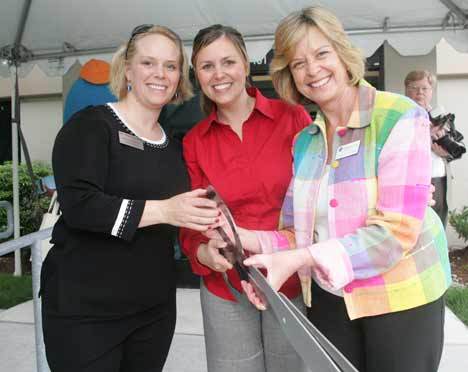Three times a week, Gary Ruggles of Covington has to come in for dialysis. It’s a four-hour-and-15-minute procedure each time to have his blood pumped out, cleaned and returned to his body, something a normally functioning kidney does on its own.
In the past, on top of that time, Ruggles spent time in traffic.
“I used to have to go to Renton,” Ruggles said, adding that he also sometimes went to the Auburn facility, both places out of the way for him.
But now, dialysis patients from the Kent Valley have a new, closer option, with the opening of the Kent Kidney Center on 74th Avenue, just south of Kent-Des Moines Road.
“It’s pretty nice to have it here in the neighborhood,” Ruggles said about halfway through a recent dialysis session. “It’s so close to home.”
It was exactly for patients like Ruggles that the Northwest Kidney Centers decided to open its newest facility in Kent.
“We decided to come to Kent because we knew there was a need here,” said Joyce Jackson, president and CEO of Northwest Kidney Centers. “Many of the Kent patients were being served in Renton and Auburn.”
The site was selected because of its accessibility from major roadways, Jackson said, and $2 million was spent to remake the building into a facility for dialysis, though Jackson said much of that was for “a lot of intensive equipment.”
But the new facility has 17 stations, capable of treating 102 patients each week. The majority of stations are in the Community Dialysis Center and include a comfortable chair, a dialysis machine, and flatscreen television, as well as a laptop (donated by the Gates Foundation) to help pass the time during dialysis.
But the facility also features a special-care section, for patients who are sicker or bedridden and require a higher level of nursing. It is the only section like it in the South Sound region, according to Northwest Kidney Centers officials. Besides the new Kent center, the closest facility offering special care is in downtown Seattle.
“We now provide special care for the whole area,” said Kent Kidney Center Manager Maggie Colin. “We’re quite unique.”
Kidney dialysis was invented in Seattle in 1960 and Colin has been working with the machines since 1962.
The kidney’s main function is to help purify the blood by removing waste products and excreting them through urine. Jackson likens it to a washing machine for the body.
When the kidney fails, toxin build-ups can lead to death. Dialysis allows those without functioning kidneys to clean the toxins from their body by passing it through a dialyzer – a scrubber of sorts – and then returning it to the body.
“We’re replacing that function of an organ with a system outside the body,” Jackson said. “Without dialysis, if you had kidney failure you would die.”
The new building also contains a new water-purification system to make sure the water used in dialysis is as clean as it can possibly be, cleaner even than drinking water.
“I’m sure the water in Kent is very good, but it’s not good enough for dialysis,” said Jackson, adding the new purification system is “cutting-edge.”
Though the facility is currently carrying a patient load of about 50 percent of capacity, Jackson said there is an “epidemic” of kidney disease in the country, noting there are presently about 500,000 people in the United States who need dialysis to stay alive.
Jackson said kidney disease is often preventable and based on diet.
Unlike some other facilities, Northwest Kidney Centers is also a nonprofit entity, meaning it relies on fundraisers and grants to stay open, though if they had it their way, there would be no need.
“We’re committed to putting ourselves out of business,” Jackson said.
For now though, patients like Ruggles won’t have to go nearly as far to get the lifesaving treatment they need.
“It’s just really nice to have it here,” he said. “I think it’s going to be great for the community.”
Talk to us
Please share your story tips by emailing editor@kentreporter.com.
To share your opinion for publication, submit a letter through our website https://www.kentreporter.com/submit-letter/. Include your name, address and daytime phone number. (We’ll only publish your name and hometown.) Please keep letters to 300 words or less.

